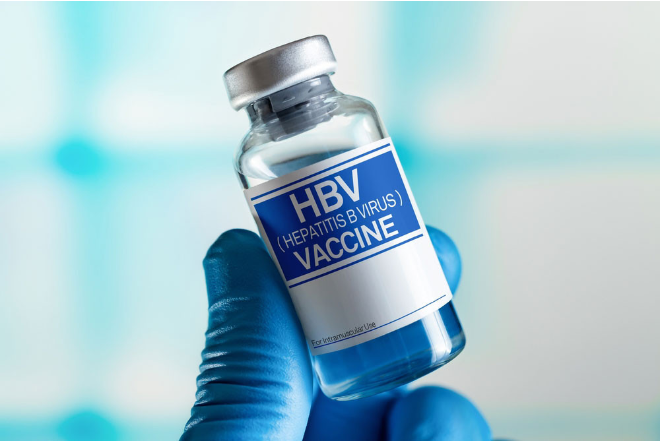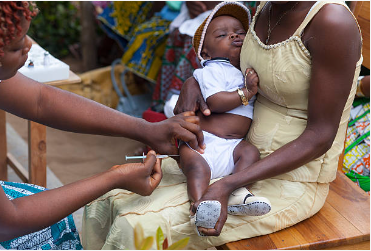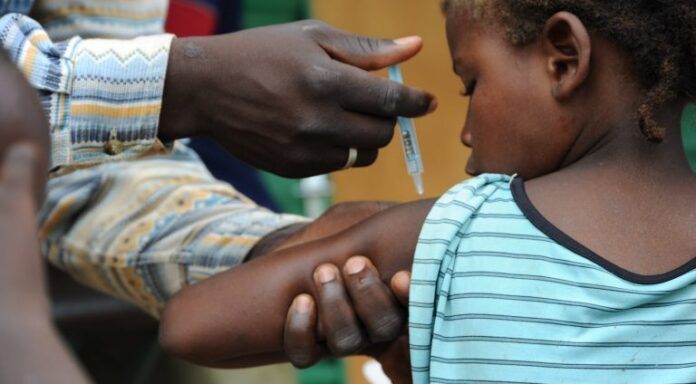|
Getting your Trinity Audio player ready...
|
By Omboki Monayo
Nairobi, Kenya: When Maureen Atieno gave birth to a baby girl in 2024, the medics handling the delivery at the private facility in Nairobi’s Umoja Two Estate told her she had to hurry and get her daughter vaccinated against Hepatitis B Virus infection.
“I was told I had to get it done as soon as possible”, says the mother of two who had been diagnosed with the disease just one month before giving birth.
Hepatitis B is liver infection by the hepatitis B virus (HBV) that is either temporary (acute) or long-lasting (chronic) and causes extensive liver damage, cirrhosis, liver cancer, and death. It is transmitted by contact with infected blood or bodily fluids such as semen, vaginal fluid, and saliva.
HBV can also be passed from mother to baby during childbirth, but it can be prevented with proper prenatal care and newborn care
“I was undergoing treatment for the condition but I was advised that the vaccine would protect my child from getting infected. The doctors told me not to delay for more than a week at most,” she told Talk Africa.
It was a hectic time for the child’s parents as the facility did not have the vaccine in stock at the time.
The couple could not find the precious jab in most state-run facilities due to a shortage.
“We called private hospitals all over the city and the quoted prices were way above what we could afford. It was a very trying time for us because our pockets were almost empty after using the bulk of our savings to pay for the baby’s delivery,” she recalls.
They finally found the vaccine on offer at an affordable price at the Kenyatta National Hospital (KNH), where Baby Sharleen was first vaccinated just three days after birth.
“It was such a relief for us to vaccinate our daughter before the crucial period expired,” her husband Fidelis said. “We feared the worst in case we missed the deadline,” he added.

Baby Sharleen’s case is not isolated. More than 91 million Africans live with Hepatitis B or C, which are the deadliest strains of the virus. According to the Viral Hepatitis Scorecard published by the World Health Organization (WHO) in 2022, about 70% of infections occur in Africa.
A landmark study has now highlighted critical failures in Africa’s fight against hepatitis B, revealing that despite available solutions, vertical or mother-to-child transmission continues unchecked in much of the continent.
The comprehensive review was published in the April 2025 edition of The Lancet medical journal. It critically examined data gathered from 190,983 pregnant women in 29 nations across Africa and observed that simple and early interventions could prevent tens of thousands of cases annually.
West Africa has the highest burden, with 5.1% of pregnant women infected with hepatitis B, which is nearly double that in East/Southern Africa (2.8%), with a 2.7% prevalence observed in Central Africa. While infections have declined from 339,000 new cases annually in 2001 to 172,000 in 2022, specialists warn progress remains perilously skewed.

Institutional loopholes, however, exist in a region where a whole generation is threatened with preventable liver disease.
The 24-Hour Lifeline
The study’s most striking discovery concerns a critical window: babies vaccinated for hepatitis B within 24 hours of being born had just a 1.8% chance of contracting the virus from infected mothers. This rose to 11.2% among unvaccinated children. Even a one-week delay in vaccination offered much better protection (6.4%) than doing nothing.
“These figures aren’t statistics – they’re the futures of children,” said lead author of the study, Dr Nicholas Riches. “We have evidence that birth-dose vaccination is effective, but only 35% of African nations are currently offering it. This isn’t merely a health failure – it’s a moral one.”
The Treatment Gap
The study discovered an even more alarming gap, 13% of pregnant women who were carrying highly infectious strains that required antiviral treatment and only three small African studies had measured real-life treatment outcomes. A pilot intervention in the Democratic Republic of Congo (DRC) demonstrated how multi-component interventions could be effective. High-risk mothers who were given the combination of antivirals and timely immunization did not transmit HBV to their babies.
“Vaccines alone are like a fishing net with holes,” added co-author Dr. Alexander Stockdale. “For women with high viral loads, we need to plug those holes with antiviral therapy. The DR Congo results demonstrate elimination is possible – if we act.”
Systemic Failures
The authors excluded 115 low-quality studies from their meta-analysis because of flawed rapid diagnostic tests (missing as many as 55% of cases) and poor reporting. Shockingly, 43% of African countries lack pregnancy infection data entirely, and rural areas are underreported in the research to a very significant degree.
According to the report, a shortage of functional cold-chain logistics that would preserve vaccines for longer periods, underfunded health systems, and home births that prevent early diagnosis of HBV cases, have worsened the crisis. In Nigeria, with a hepatitis B prevalence of 11% in pregnant women, only 58% of births occur in health facilities – making it almost impossible for the vast majority to be vaccinated in a timely manner.
A Roadmap for Elimination
To address Africa’s hepatitis B epidemic, the authors propose an urgent, multi-faceted intervention strategy. Their approach begins with the rapid implementation of birth-dose vaccination programs supported by the Global Vaccine Alliance (Gavi) to deliver all newborns this critical first-line protection within 24 hours of birth.
Aside from vaccine scale-up, they emphasize large-scale deployment of point-of-care diagnostic testing to correctly identify pregnant women with high viral loads who require further interventions.
Above all else, the group encourages the introduction of antiviral treatment programs into existing HIV and syphilis prevention measures, creating an overarching strategy for vertical transmission which exploits existing health care infrastructure and maximizes limited resources.
According to the authors, this combined strategy of vaccinating expansion, targeted testing, and adding antiviral therapy will provide Africa with an optimal opportunity for reaching WHO elimination targets by 2030.
Data modelling suggests that a 90% birth-dose coverage would reduce HBV transmissions by 44%, and the addition of antiviral treatment for eligible mothers would reduce rates by 86% – avoiding 148,000 infections annually and putting the WHO’s 2030 elimination target within reach.
“The solutions are present today,” Stockdale stressed. “What is missing is political will and synchronized funding. Every year we delay, another generation pays the price.”
With 80% of liver cancer in Africa caused by untreated hepatitis B, and treatment cost estimated at just $3 or Ksh389 per child, the researchers conclude that the continent can end the scourge by taking drastic action to curb the crisis.














